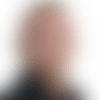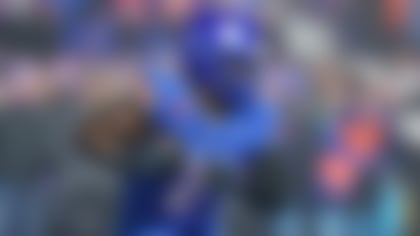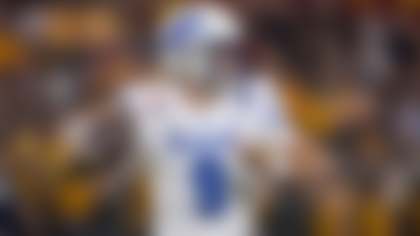METAIRIE, La. -- Mark Ingram and Alvin Kamara have anchored the New Orleans Saints' backfield the past two seasons as one of the NFL's top rushing tandems -- and they both made the Pro Bowl after the 2017 campaign.
New Orleans' offensive line, widely regarded as one of the league's best units, deserves a lot of credit for opening holes for Ingram and Kamara -- and left tackle Terron Armstead and center Max Unger made the Pro Bowl after the 2018 season.
Meanwhile, one of the players who makes it all go is flying under the radar -- and he's perfectly OK with that.
"If those guys are doing well, that means I'm doing my job," fullback Zach Line said recently, ahead of the Saints' Divisional Round showdown with the Eagles. "When I go in, I want to make sure we have a productive play, because we're not going to call 21 (two running backs, one tight end) or 22 personnel (two running backs, two tight ends), which is what I'm in, if we're not having productive runs, whenever the play is called.
"There's a little bit of an ego sense to the fullback position, because if you can make a big block -- people hear the crack -- that's one of those you're kind of setting the tempo or you're creating a spark for the offense. I feel like sometimes if you make a big block to clear a running back, people see that."
Whether he's taking on a defensive lineman or a linebacker at the line of scrimmage or setting the edge, the 6-foot-1, 233-pound Line rarely receives credit for helping spring Ingram or Kamara loose out of the backfield -- the big gains and scoring runs to which he contributes don't get attached to his name.
After all, Line plays a position that is planted firmly outside of the spotlight in today's score-happy NFL -- "fullback" hasn't even been given a specific slot on the Associated Press All-Pro roster since the 2015 season, replaced beginning in the 2016 season by a "flex" position that has been filled by receivers and running backs in every year of its existence. But Line's contributions aren't lost on teammates.
"He's the best fullback in the game," Ingram said emphatically. "I don't think you can put another fullback near him. I don't think you can put up another fullback's numbers, as far as his runners having the production that we've had running behind him."
Armstead agreed.
"We love Zach for what he does for the team," Armstead said. "He has a skill set that he might not get enough credit for. Zach can run, he can fly. His ability to get to the second level faster than some other guys is an advantage for us."
The high praise extends beyond the offensive side of the football, to the members of the Saints' defense. Linebacker Craig Robertson enjoys watching Line deliver bone-crushing blocks from the sidelines.
"Fullbacks don't get recognition," Robertson said. "It's just, do your job and get no praise for it, but when you see a guy block like that, you see him open it up for A.K. and Mark, you just watch those guys run, but nobody says anything about Zach. It's crazy.
"He'll do it week in and week out, play injured, whatever -- he just gets the job done. And when you see that from somebody, you want to praise somebody like that, because they're not getting it anywhere else. We call him 'Dozer for a reason -- not Bulldozer, just 'Dozer."
Honing his craft
Line finished his college career at Southern Methodist as an accomplished tailback, notching three straight 1,000-yard rushing seasons (from 2010 through '12) and totaling 47 touchdowns while averaging 5.4 yards per carry in four years. For some perspective on his productivity, consider that Line left SMU with 4,185 yards rushing, which is second in school history, behind Pro Football Hall of Famer Eric Dickerson's 4,550 yards.
He entered the NFL in 2013, signing with the Vikings as an undrafted rookie free agent. But Minnesota already had All-Pro running back Adrian Peterson on the roster, so Line found himself moved to fullback, where he experienced a transition while learning under Pro Bowl fullback Jerome Felton.
The first priority was to pack on the pounds to prepare for life in the trenches.
"I put on some weight because I was probably 225 pounds," Line said. "My first year, I was like 230, so now I maintain about 240, and that's a comfortable weight for me to play fullback, because it seems like most linebackers these days are right around 240, which would be a heavier linebacker. You see a lot of them at 235."
The second phase of Line's transformation didn't occur overnight. He admits it took him two years to fully adjust from running back to becoming a lead blocker.
"In college, I spent my whole time trying to create arm tackles, setting guys up to where I can beat them with power," Line said. "Then you come to the NFL, I'm taking on guys square.
"They want you taking on guys square and moving them, so that was a little bit of a transition. Fortunately, I had Jerome Felton. He was a thumper when he was playing, and he was good to learn from."
Line further credits former Vikings running backs coach Kirby Wilson for his overall development and for providing the tools to absorb proper technique and set up contact.
And when all else failed during the transition process, one of the NFL's all-time greatest rushers didn't hesitate to provide on-the-spot constructive criticism -- like whenever Line thought too much on the field.
"Adrian Peterson didn't like that," Line recalled with a chuckle. "He was like, 'You got to go. I don't care where you go. Just create a lane.' I never fully grasped that until I saw Jerome doing it. I think seeing over time other guys doing it helped me see what I had to do."
Felton, also a converted college running back who ended up playing for five different teams from 2008 to 2016, understood what Line was going through and helped out his young teammate along the way.
"He sort of had the same issues I had in developing that fullback mindset of no fear, no hesitation and running through people, getting used to leading people through a hole," Felton said in a telephone interview. "That's something I tried to instill in him of no hesitation, no gathering, just kind of run through people. He figured it out quick."
The trust factor
Line became a key piece of the team's ground game, and it didn't take long for Ingram and Kamara to realize what they had in front of them on any given play, with the fullback bringing experience, intelligence and athleticism.
"Zach sees it as a running back," Kamara said. "He sees it all. It's easy when you have somebody in front of you that sees it all like Zach, so I trust whatever decision he makes. I trust him."
Ingram, who admits he didn't always like playing with a fullback until Kuhn and Line arrived, echoed Kamara's opinion of their current lead blocker.
"He's fast, he's agile, so he sees a lot of things like a running back, not necessarily as a fullback," Ingram said. "We just love running behind him, man, because he's staying out of the way and he moves people out of the way. We love that."
In Line's first year with the Saints, Kamara and Ingram combined to become the first running back duo from the same team in NFL history to each record at least 1,500 yards from scrimmage in a single season. Kamara went on to be named the NFL's Offensive Rookie of the Year following the 2017 season, while Ingram notched his second consecutive 1,000-yard rushing campaign.
During the 2018 regular season, Kamara once again totaled 1,500-plus yards from scrimmage and added 18 touchdowns. Ingram, who missed the first four games while serving a suspension, rushed for 645 yards and six touchdowns.
The two star running backs command the spotlight on the Saints' sixth-ranked rushing offense, of course, but their success is all part of a hard day's work for Line.
"I want to open holes for these guys, just wearing down a defense throughout a game," Line said. "I love when we go heavy personnel."
'He's just a weapon'
What makes Line's transformation from running back to fullback more impressive is his ability to find a niche at a position that, for the most part, has slowly disappeared around the league.
Eagles head coach Doug Pederson -- who has roots in the West Coast offense, which often utilizes fullbacks -- believes how football is now played at the high school level has trickled up to the college and professional ranks.
"You don't see many of these fullback-type bodies in high school," Pederson said in a teleconference ahead of Sunday's game. "Everybody is running the spread offense, and it carries over into college. Even if there's a tight end out there that has that body type, they either keep him as an in-line blocker on the line of scrimmage or he ends up turning into a hybrid receiver-type guy. It's just hard to find those guys."
Still, teams that are able to incorporate the fullback position into a scheme often reap the rewards.
"I think some would say it's going away," Saints head coach Sean Payton said. "And yet, I think there's still a number of offenses valuing that position, depending on what you're wanting to do, system-wise.
Enter Line, whose versatility as a blocker, rusher and receiver out of the backfield, along with his ability to contribute on special teams (he ranks seventh on the team with 187 special teams snaps), has proven an ideal fit for the Saints, who used two or more running backs on 26.1 percent of their offensive plays in 2018 (third-most in the NFL, according to Next Gen Stats). New Orleans also employed 21 personnel on 9.7 percent of their offensive plays (10th-most) and used 22 personnel on 5.9 percent of plays (tied for fifth-most).
"I think there's a toughness element in being able to block in the run game and in protection," Payton said. "No. 2, I think that player -- and I'm talking about the substituted goal-line fullback -- but I think that player generally has good hands.
"At least we're looking for those traits, and in Zach's case, we have a former running back. ... So, we feel like he's someone that can help in a number of areas and also in the kicking game, and I think that's a starting point."
Line -- who does have six career touchdowns to his name, including two runs and four catches -- didn't make the Pro Bowl this season, but there's little doubt how his peers feel about him as he performs a thankless job.
"He's good at pass protection, he's good at run-blocking, he's a good pass-blocker, he's a smart player, he can catch the ball out of the backfield, he's just a weapon," Ingram said. "It's hard to find a fullback that's reliable or trustworthy as he is."
Line's former teammate in Minnesota also believes the Saints fullback should have garnered all-star recognition, but Felton quickly pointed out that respect and admiration from teammates, opponents and coaches around the league carries greater significance.
"One thing I took a lot of pride in -- and I'm sure Zach does, too -- I really took a lot of pride in how my peers thought about me, how coaches thought about me, the linebackers I played thought about me," Felton said. "You could probably go around the league and the guys that played against Zach, I think he has a lot of respect from linebackers and coaches.
"There's not another guy that I would rather have lead-blocking for me if I was a tailback than Zach Line right now in the NFL for sure, without a doubt."
Line, who signed a two-year deal to return to New Orleans during the 2018 offseason, appreciates the support and kind words from others.
And to him, their backing matters more than his individual accomplishments, as the fullback embraces his under-the-radar responsibilities to help the Saints contend for a championship.
"I couldn't care less with the love you get off the field, but the guys in here, you get respect from your teammates if you stick your nose in the dirty places," Line said. "That's all I really care about. Being in the Super Bowl is the final destination, so as long as I'm doing my job and that's my role, I know my role."
Follow Herbie Teope on Twitter @HerbieTeope












